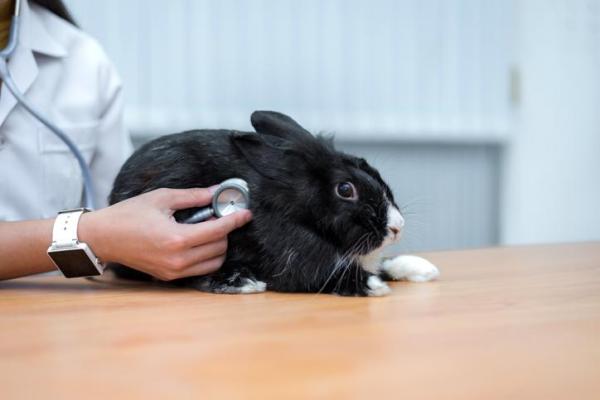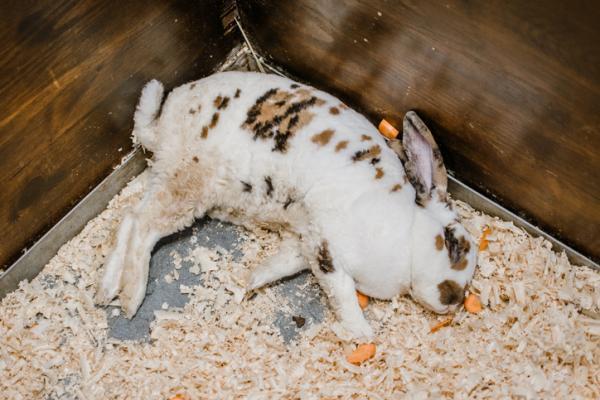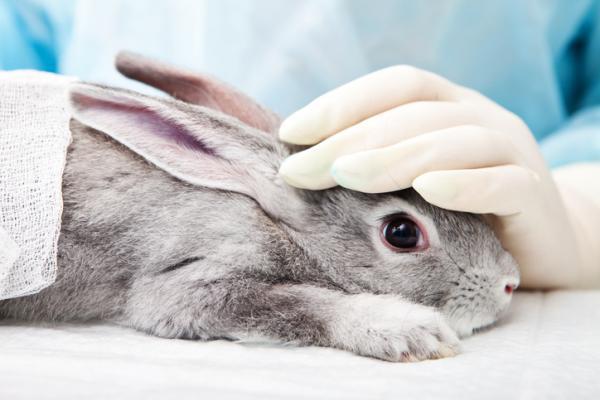Fever in Rabbits - Symptoms, Causes and Treatment



See files for Rabbits
Rabbits make excellent pets, but as with any other pet, getting a rabbit requires preparation and knowledge of what you are getting into. Rabbits are at the bottom of the food chain and in the wild, the weakest are the first to be hunted. Therefore, rabbits naturally tend to hide their illnesses and injuries, including fevers. In domestic rabbits, this only misleads their caretakers and prevents prompt medical attention. This is why it is so important to pay special attention to subtle changes in animal behavior.
In the following article from Animal wised, you will learn what a fever in rabbits is, what the symptoms are, what causes it, and what you can do if you find yourself in this situation.
What is fever in rabbits?
Fever, also called fever syndrome or pyrexia, occurs when the body temperature of a homeothermic organism rises. Homeothermic organisms are any warm-blooded animal that maintains its body temperature thanks to its internal functions without dependence on the external temperature. Fever can be caused by various situations such as infection, poisoning, damage to the thermoregulatory center, or disease.
Usually, fever in rabbits is caused by infectious processes, as we will see below. If you suspect that your rabbit is sick, we advise you to take it to the vet as soon as possible.
Symptoms of fever in rabbits
Body heat is the most common symptom of a rabbit with a fever. Rabbits regulate their body temperature through their ears. Very cold or hot ears may be an indication of fever or a drop in body temperature.
In most cases, fever is also accompanied by other warning signs, such as the following:
- Increased heart rate or tachycardia
- Increased respiratory rate or tachypnea
- Tooth grinding
- Loss of appetite or lethargy
- Constipation
- Depression
- Watery or half-closed eyes
- Shivering or shaking, seek warm places
- Hot and/or dry nose
- Loss of balance or a head tilt
- Wet chin or drooling
Remember that some rabbits may also show symptoms of digestive problems. Your rabbit's litter box contains a wealth of information. A healthy digestive tract produces large, round fecal pellets. Increasingly smaller, irregularly shaped droppings or droppings with fur may indicate a problem.

Causes of fever in rabbits
Fever is a defense mechanism against threatening health factors, especially infections, in which the body raises its temperature to make reproduction more difficult for pathogens. The most common infections in rabbits that can cause fever are:
- Viral hemorrhagic disease: viral hemorrhagic disease is caused by a calicivirus. Although the incubation period is up to three days, animals may die suddenly without clinical signs. The disease is transmitted through direct contact with infected rabbits, rabbit products, rodents, and contaminated cages, dishes, and clothing.
- Encephalitozoonosis: Is a microscopic parasitic organism that must live in a cell to survive. It can infect rabbits, mice, hamsters, dogs, cats, guinea pigs and humans. It is transmitted in rabbits from mother to offspring in utero and from rabbit to rabbit through infected urine.
- Myxomatosis: This disease is caused by myxoma virus, which is common in the wild rabbit population. Even if your rabbit never comes into direct contact with wildlife, it can still become infected with this disease because the virus is transmitted through bites from mosquitoes, flies, fur mites and fleas.
- Otitis media: Middle ear infection (otitis media) and inner ear infection (otitis interna) are diseases that cause inflammation of the middle and inner ear canals, respectively, in rabbits. It is usually caused by a bacterial infection that has spread from the outer ear cavity to the inner ear.
- Mastitis: Mastitis is an infection of the mammary tissue that causes pain, swelling, heat in the area and redness. The condition can be serious and must be treated promptly by a veterinarian so that the rabbit's condition does not worsen. Continue reading this other article if you want to learn more about mastitis in rabbits.
- Pneumonia: Pneumonia occurs when there is severe inflammation in the lungs that leads to dysfunction of the entire respiratory system. This inflammation may be due to a bacterial, fungal, viral, or parasitic infection, or it may be due to the rabbit inhaling a foreign body into its lungs.
- Tularemia: Tularemia is a bacterial disease caused by the bacterium Francisella tulariensis. It can affect lagomorphs and rodents, which typically act as vectors. It can then be transmitted to livestock, pets such as cats and dogs, and humans. Furthermore, it can also be transmitted through direct contact with an infected specimen or its environment. It can also be transmitted by a vector such as ticks, mosquitoes, or horseflies.
Continue reading this other article if you want to learn more about tularemia in rabbits.
How to take a rabbit's temperature?
It is important for every rabbit owner to know how to take a rabbit's temperature. Although it is not difficult, it can be intimidating at first. The temperature of a healthy rabbit is between 101 and 103 (38.5 °C and 40 °C). Remember, however, that just as with humans, a rabbit's normal temperature can vary from person to person.
The best way to find out what is normal for your rabbit is to take the temperature at different times (different days and different hours). Becoming familiar with taking the temperature will mean less stress for you and your rabbit and will lead to a more consistent result.
The best way to take your rabbit's temperature is with a rectal thermometer. However, the fact that the rabbit is restrained or turned on its back during this process makes the whole procedure uncomfortable for the rabbit.
Your veterinarian may be able to take your rabbit's temperature while the rabbit is standing, but most animal caretakers prefer to take the rabbit's temperature while it is lying on its back in someone's arms. This allows you to survey the area, easily read the clinical thermometer, and most importantly, minimize the risk of the rabbit jumping and hurting itself while the thermometer is inserted.
Fever in rabbits can be caused by all sorts of health problems, as mentioned earlier. Continue reading this other article if you want to learn more about the most common diseases in rabbits.
What to do if your rabbit has a fever?
If you suspect your rabbit has fever, you should immediately go to the vet. Remember that fever can be a sign of a health issue that requires urgent medical attention. Additionally, if you do not have a thermometer and suspect that your rabbit suffers from a fever, you should seek immediate attention from an exotic veterinarian.
If you can not go right away, you should try to bring the fever down with soft cloths or damp towels over the ears, keep the rabbit hydrated. This is only a temporary solution and only works for a short time. The same day, or in 24 hours at the latest, you should take the animal to a veterinary center.
You should not administer medications for human use or look for home remedies.
The best prevention for fever in rabbits is regular vaccinations and deworming, as well as regular checkups. Also, keep your rabbit in a clean, well-ventilated and comfortable place, with a balanced diet of good quality and fresh, clean water.
Continue reading this other article if you want to learn more about vaccinations in rabbits, the most common vaccines, and a vaccination schedule.

This article is purely informative. AnimalWised does not have the authority to prescribe any veterinary treatment or create a diagnosis. We invite you to take your pet to the veterinarian if they are suffering from any condition or pain.
If you want to read similar articles to Fever in Rabbits - Symptoms, Causes and Treatment, we recommend you visit our Other health problems category.







